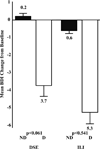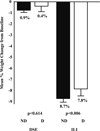One-year changes in symptoms of depression and weight in overweight/obese individuals with type 2 diabetes in the Look AHEAD study
- PMID: 22016099
- PMCID: PMC3298842
- DOI: 10.1038/oby.2011.315
One-year changes in symptoms of depression and weight in overweight/obese individuals with type 2 diabetes in the Look AHEAD study
Abstract
Depressed individuals are frequently excluded from weight loss trials because of fears that weight reduction may precipitate mood disorders, as well as concerns that depressed participants will not lose weight satisfactorily. The present study examined participants in the Look AHEAD study to determine whether moderate weight loss would be associated with incident symptoms of depression and suicidal ideation, and whether symptoms of depression at baseline would limit weight loss at 1 year. Overweight/obese adults with type 2 diabetes (n = 5,145) were randomly assigned to an Intensive Lifestyle Intervention (ILI) or a usual care group, Diabetes Support and Education (DSE). Of these, 5,129 participants completed the Beck Depression Inventory (BDI) and had their weight measured at baseline and 1 year. Potentially significant symptoms of depression were defined by a BDI score ≥10. Participants in ILI lost 8.6 ± 6.9% of initial weight at 1 year, compared to 0.7 ± 4.8% for DSE (P < 0.001, effect size = 1.33), and had a reduction of 1.4 ± 4.7 points on the BDI, compared to 0.4 ± 4.5 for DSE (P < 0.001, effect size = 0.23). At 1 year, the incidence of potentially significant symptoms of depression was significantly lower in the ILI than DSE group (6.3% vs. 9.6%) (relative risk (RR) = 0.66, 95% confidence interval (CI) = 0.5, 0.8; P < 0.001). In the ILI group, participants with and without symptoms of depression lost 7.8 ± 6.7% and 8.7 ± 6.9%, respectively, a difference not considered clinically meaningful. Intentional weight loss was not associated with the precipitation of symptoms of depression, but instead appeared to protect against this occurrence. Mild (or greater) symptoms of depression at baseline did not prevent overweight/obese individuals with type 2 diabetes from achieving significant weight loss.
Figures


References
-
- Keys A. Biology of human starvation. Minneapolis: University of Minnesota Press; 1950.
-
- Stunkard AJ. The dieting depression, incidence and clinical characteristics of untoward responses to weight reduction regimens. Am J Med. 1957;23:77–86. - PubMed
-
- Chaput JP, Arguin H, Gagnon C, Tremblay A. Increase in depression symptoms with weight loss: association with glucose homeostasis and thyroid function. Appl Physiol Nutr Metab. 2008;33:86–92. - PubMed
-
- Pagoto S, Bodenlos JS, Kantor L, Gitkind M, Curtin C, Ma Y. Association of major depression and binge eating disorder with weight loss in a clinical setting. Obesity. 2007;15:2557–2559. - PubMed
-
- Ludman E, Simon GE, Ichikawa LE, et al. Does depression reduce the effectiveness of behavioral weight loss treatment? Behav Med. 2010;35:126–134. - PubMed
Publication types
MeSH terms
Grants and funding
- DK57078/DK/NIDDK NIH HHS/United States
- U01 DK057151/DK/NIDDK NIH HHS/United States
- DK57151/DK/NIDDK NIH HHS/United States
- U01 DK057154/DK/NIDDK NIH HHS/United States
- U01 DK057171/DK/NIDDK NIH HHS/United States
- U01 DK057182/DK/NIDDK NIH HHS/United States
- U01 DK057136/DK/NIDDK NIH HHS/United States
- U01 DK057002/DK/NIDDK NIH HHS/United States
- U01 DK057177/DK/NIDDK NIH HHS/United States
- M01 RR001066/RR/NCRR NIH HHS/United States
- U01 DK057078/DK/NIDDK NIH HHS/United States
- M01RR000056/RR/NCRR NIH HHS/United States
- DK57135/DK/NIDDK NIH HHS/United States
- P30 DK048520/DK/NIDDK NIH HHS/United States
- U01 DK057135/DK/NIDDK NIH HHS/United States
- UL1 RR024153/RR/NCRR NIH HHS/United States
- P30 DK046204/DK/NIDDK NIH HHS/United States
- DK57171/DK/NIDDK NIH HHS/United States
- M01 RR002719/RR/NCRR NIH HHS/United States
- DK57131/DK/NIDDK NIH HHS/United States
- M01 RR000056/RR/NCRR NIH HHS/United States
- U01 DK057219/DK/NIDDK NIH HHS/United States
- DK57149/DK/NIDDK NIH HHS/United States
- U01 DK056992/DK/NIDDK NIH HHS/United States
- P30 DK050456/DK/NIDDK NIH HHS/United States
- P30 DK079637/DK/NIDDK NIH HHS/United States
- M01RR01066/RR/NCRR NIH HHS/United States
- DK57182/DK/NIDDK NIH HHS/United States
- DK57002/DK/NIDDK NIH HHS/United States
- M01RR01346/RR/NCRR NIH HHS/United States
- DK57178/DK/NIDDK NIH HHS/United States
- P30 DK48520/DK/NIDDK NIH HHS/United States
- DK57008/DK/NIDDK NIH HHS/United States
- K23 HL109235/HL/NHLBI NIH HHS/United States
- U01 DK057131/DK/NIDDK NIH HHS/United States
- M01 RR000051/RR/NCRR NIH HHS/United States
- DK57136/DK/NIDDK NIH HHS/United States
- DK57154/DK/NIDDK NIH HHS/United States
- DK57219/DK/NIDDK NIH HHS/United States
- DK57177/DK/NIDDK NIH HHS/United States
- U01 DK056990/DK/NIDDK NIH HHS/United States
- U01 DK057178/DK/NIDDK NIH HHS/United States
- U01 DK057008/DK/NIDDK NIH HHS/United States
- DK56990/DK/NIDDK NIH HHS/United States
- M01RR0021140/RR/NCRR NIH HHS/United States
- DK 046204/DK/NIDDK NIH HHS/United States
- U01 DK057149/DK/NIDDK NIH HHS/United States
- UL1 RR 024153/RR/NCRR NIH HHS/United States
- K23HL109235/HL/NHLBI NIH HHS/United States
- M01RR02719/RR/NCRR NIH HHS/United States
- M01 RR001346/RR/NCRR NIH HHS/United States
- DK56992/DK/NIDDK NIH HHS/United States
- P30 DK017047/DK/NIDDK NIH HHS/United States
- M01RR00051/RR/NCRR NIH HHS/United States
LinkOut - more resources
Full Text Sources
Medical

